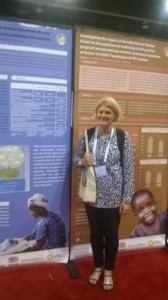IAS 2015: m2m in Vancouver

Dr. Kathrin Schmitz, Director of the Department of Programmes & Technical Support, in front of m2m’s posters at IAS
Here are three of the posters already on display at IAS:
Telephonic Defaulter Tracing by Mentor Mothers for eMTCT
Background: The Kenya Mentor Mother Program (KMMP) aims to promote PMTCT (prevention of mother-to-child transmission) and better client outcomes by integrating mothers living with HIV into the health sector to provide peer education and psychosocial support to their clients as Mentor Mothers. PMTCT is part of the Kenya’s 2012 eMTCT (elimination of mother-to-child transmission) framework.
Methods: Group education sessions, one-on-one/couples education, defaulter tracing (PMTCT priority events, AN re-testing, PN 6 week visit), support/empower clients on MNCH (maternal, newborn, and child health), PMTCT services.
Results: In 2014, MMs enrolled 58,026 new HIV-negative pregnant and HIV-positive pregnant and postpartum clients at the 30 m2m-supported KMMP facilities.
Defaulter tracking success rate:
- 11.4 % (6,658 out of 58,026) missed their appointments during the observation period.
- MMs successfully reached 68% (4,559) of the defaulted clients either through SMS or a phone call during the same period.
- 89% (4,044) of missed appointments were resolved.
Overall results:
- 93% of m2m’s post-natal clients had completed a 6-week EID (early infant diagnosis) test
Conclusion: Site level documentation and telephonic defaulter tracing by Mentor Mothers is an effective strategy for promoting retention of PMTCT clients in care and better client outcomes. The intervention might be viable for scale up as part of the country’s national KMMP effort.
View the Poster
The cost-effectiveness of the mothers2mothers Mentor Mother Model as a psychosocial wellbeing intervention
Background: m2m’s impact on psychosocial wellbeing was used in a cost-effective analysis of the m2m Mentor Mother Model implemented under the STAR-EC Programme in Uganda compared with PMTCT services without psychosocial support.
Aim: Impact the health of m2m’s clients by addressing the challenges facing HIV-positive pregnant women and mothers, thus improving their psychosocial wellbeing.
Methods: Quasi-experimental matched area comparison design, Psychosocial Wellbeing surveys, standardised questionnaire informed by the m2m Theory of Change, Principal Component Analysis, incremental effectiveness/cost calculations.
Results:
- 8.2% (7,442) women with better psychosocial wellbeing due to m2m.
- Incremental cost effectiveness ratio (ICER): 601.9.
Conclusion: Psychosocial support is sometimes overlooked in the care and treatment of PMTCT clients. Yet, literature suggests that subjectively experienced wellbeing impacts on healthy choices and improves health and longevity. m2m’s model of care is an important, cost-effective component of service delivery in the area of public health.
View the Poster
Investigating the impact of the m2m Mentor Mother Model on the psychosocial wellbeing of HIV positive pregnant women and new mothers accessing prevention of mother-to-child transmission of HIV services
Background: Through the education and psychosocial support that Mentor Mothers provide women, they develop the beliefs, attitudes, and skills necessary to overcome negative social norms that impact them, their families, and communities.
Aim: Investigate whether maternal psychosocial wellbeing and empowerment outcomes were associated with exposure to Mentor Mothers.
Method: Quasi-experimental matched area comparison design, Psychosocial Wellbeing surveys, standardised questionnaire informed by the m2m Theory of Change, bivariate and multivariate inferential statistical analysis using STATA 12, Propensity Score Matching.
Results: Clients exposed to m2m support demonstrated better psychosocial wellbeing and empowerment outcomes compared to non m2m exposed clients.
Average effects among clients in m2m sites:
- 87% demonstrate coping self-efficacy.
- 69% demonstrate coping behaviour.
- 80.1% experience of social support.
- 71.7% demonstrate HIV disclosure and safer sex self-efficacy.
- 83.3% did not experience depression.
- 95.2% experience good relationship with health worker.
- 72.2% experience good relationship with health partner.
- 40.2% demonstrate coping with stigma.
- 99.5% demonstrate no experience of internalised stigma.
- 87.1% have accurate HIV knowledge.
- 44.7% have positive gender attitudes.
Conclusion: Exposure to m2m’s psychosocial support positively impacts on the psychosocial wellbeing and empowerment of pregnant women and new mothers.
View the Poster






















